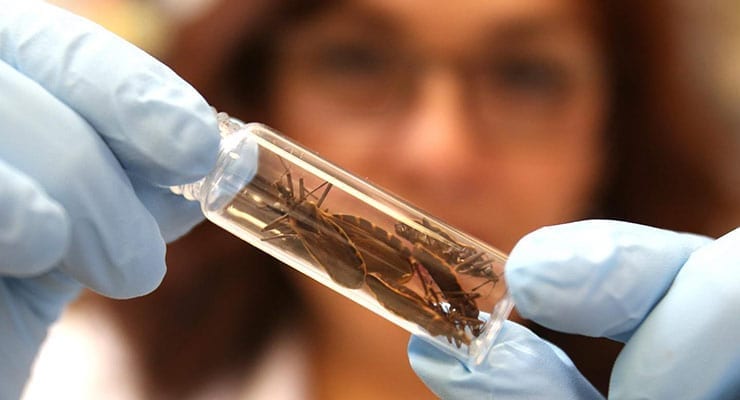A deadly parasite that causes Chagas disease is widespread in a common Texas insect, according to a new study by University of Texas at El Paso (UTEP) researchers. The finding suggests that the risk of Texans contracting the disease may be higher than previously thought.
The parasite Trypanosoma cruzi (T. cruzi), which causes Chagas disease can be transmitted to humans by blood-sucking insects known as “assassin bugs” or “kissing bugs.” Unlike mosquitoes that transmit malaria through the bite, kissing bugs drop feces on the subject while filling up with blood. The feces, which are contaminated with the parasite, often lands in the bite wound. From there, it penetrates the bloodstream and affects the heart and gastrointestinal system.
Curious to know the prevalence of T. cruzi in west Texas insects, UTEP biologists set traps to collect the bugs at the University’s Indio Mountains Research Station. The station sits about 100 miles north of the U.S.-Mexico border in Hudspeth County, Texas.
In all, the researchers trapped 39 kissing bugs (Triatoma rubida) and tests revealed that 24 bugs– or 61 percent — were infected with T. cruzi. The findings were published in the journal Acta Tropica.
“It surprised me that so many of them were carrying the parasite,” says Rosa A. Maldonado, D.Sc., an associate professor of biological sciences at UTEP who led the study. “I was expecting to have some, but this is quite high.”
Maldonado adds that there’s a high rate of heart disease along the border and one of the causes could be Chagas disease.
Thirty percent of people infected with the parasite develop life-threatening symptoms like heart rhythm abnormalities and difficult eating or passing stool. The disease can also lead to an enlarged esophagus, colon and heart, and even, heart failure.
“Doctors usually don’t consider Chagas disease when they diagnose patients, so they need to be aware of its prevalence here,” says Maldonado. To prevent parasite transmission by the kissing bug, the biologist says it’s important to be aware of the presence of the bugs in the house and yard because pets like dogs and cats are also vulnerable.
But getting bitten by a kissing bug isn’t the only way to contract the disease. Once a human is infected, the parasite can be transmitted to others via organ transplants, blood transfusions and from a mother to a fetus. In addition, the parasite can be spread through foods and juices tainted by the contaminated bug feces.
Maldonado hopes her work brings more awareness to the often overlooked disease, which she calls an emerging infectious disease in the U.S. The biologist is currently investigating the prevalence of T. cruzi in kissing bugs, street dogs and cats found in El Paso, Texas, an urban city on the U.S.-Mexico border with more than 675,000 residents.
Read more: Incidence of Trypanosoma cruzi infection in triatomines collected at Indio Mountains Research Station.


